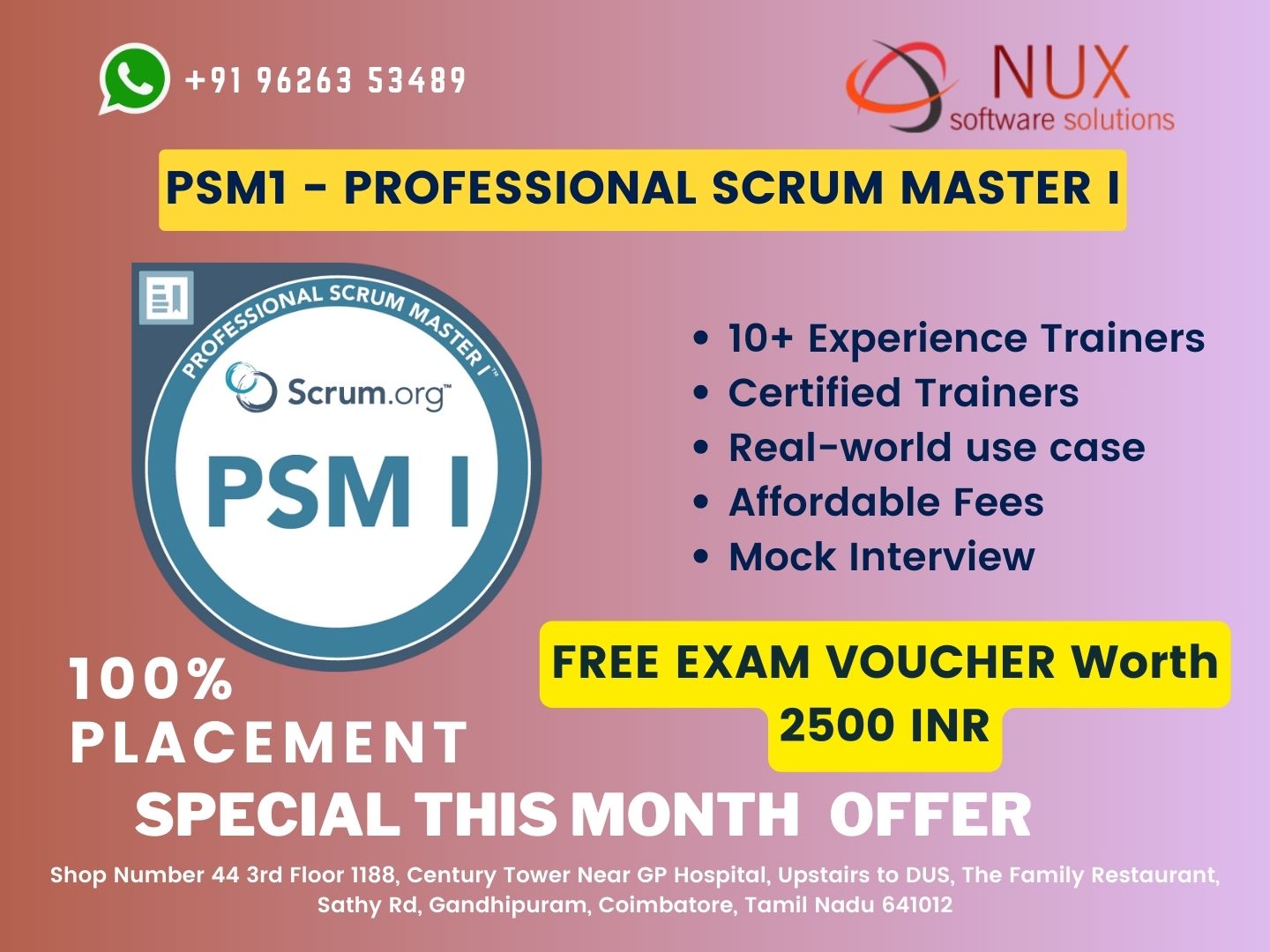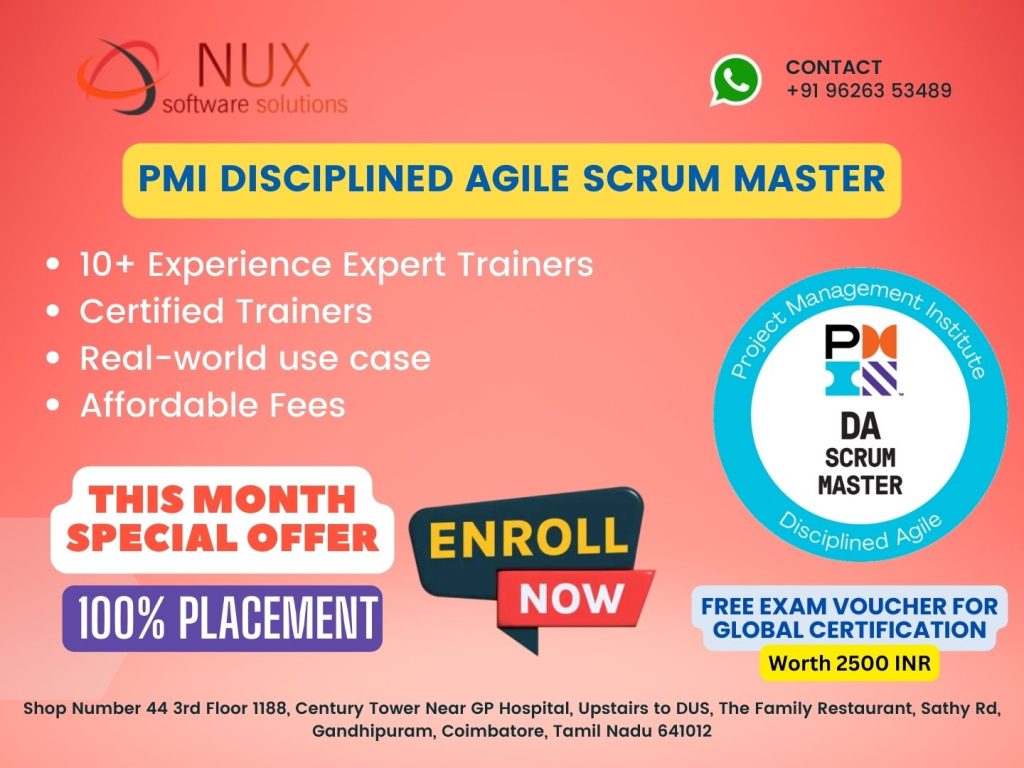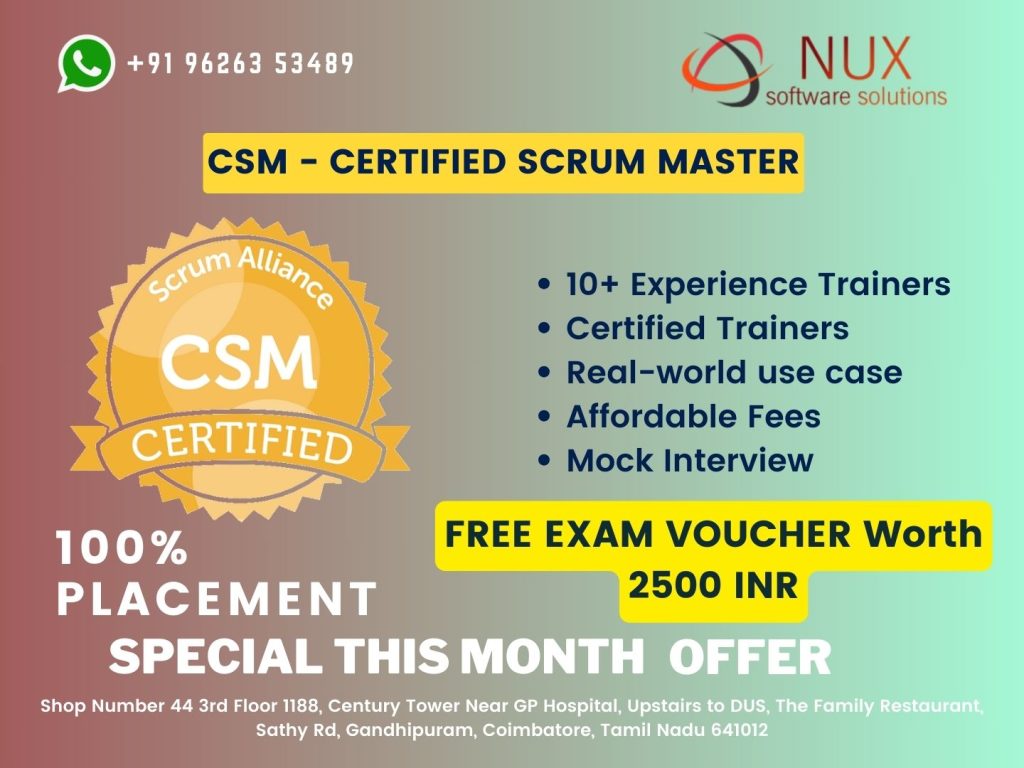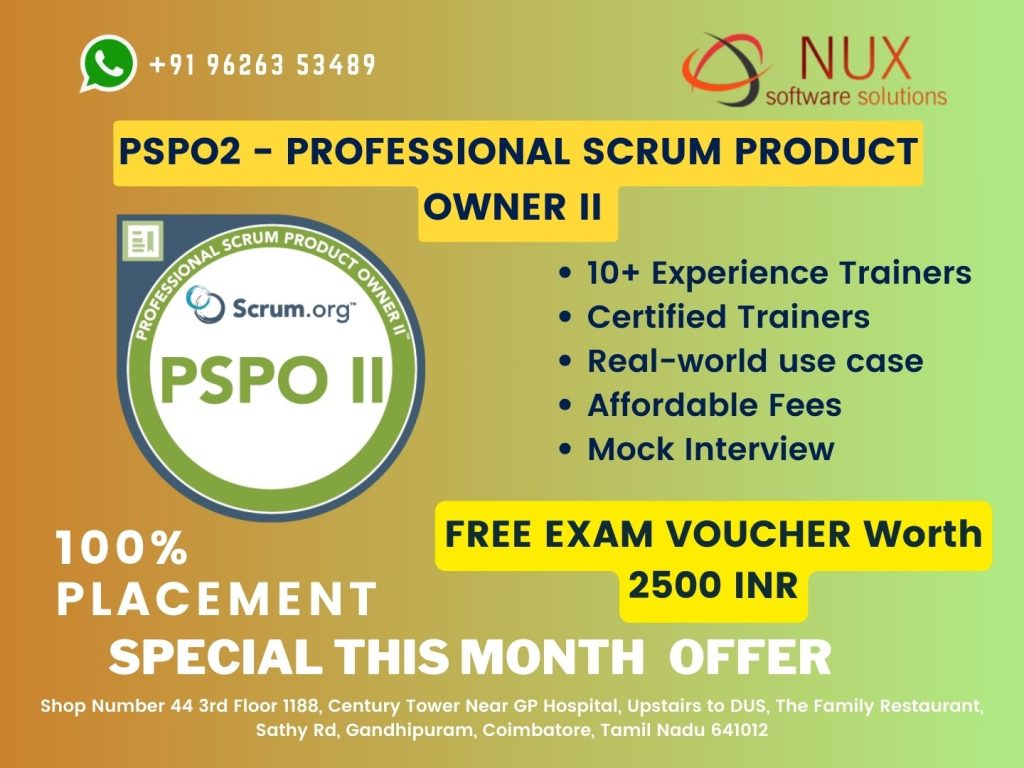Professional Scrum Master I

Professional Scrum Master I Certification
Elevate Your Agile Leadership Skills with Linux training center in Coimbatore
Are you ready to take your project management career to the next level? Look no further than the Professional Scrum Master I (PSM I) certification course offered by Linux training center in Coimbatore. This comprehensive program is designed to equip you with the knowledge and skills necessary to excel as a Scrum Master in today’s fast-paced, agile-driven software development environment.
Why Choose PSM I Certification?
The PSM I certification is a globally recognized credential that validates your understanding of Scrum principles and your ability to apply them effectively in real-world scenarios. As organizations increasingly adopt agile methodologies, the demand for skilled Scrum Masters continues to grow. By obtaining your PSM I certification, you’ll position yourself as a valuable asset in the job market and open doors to exciting career opportunities.
Linux training center: Your Trusted Training Partner in Coimbatore
Nux Software Solution has established itself as a leading provider of IT training and certification programs in Coimbatore. With a team of experienced trainers and a proven track record of success, Nux Software Solution offers a learning experience that is both comprehensive and practical. Their PSM I course is tailored to meet the needs of aspiring Scrum Masters, ensuring that you gain the skills and confidence required to excel in this role.
Why Choose Linux training center for Your PSM I Training?
- Expert Trainers: Learn from certified Scrum professionals with extensive industry experience
- Hands-on Approach: Gain practical skills through interactive sessions and real-world examples
- Flexible Learning Options: Choose from in-person or online training to suit your schedule
- Comprehensive Study Materials: Access high-quality course materials and resources
- Post-Training Support: Benefit from ongoing support and guidance even after course completion
- Networking Opportunities: Connect with like-minded professionals and expand your professional network
Course Duration and Format
The PSM I certification course at Nux Software Solution is typically conducted over 2-3 days, depending on the chosen format. Both weekday and weekend batches are available to accommodate working professionals.
Invest in Your Future with PSM I Certification
In today’s competitive job market, having a PSM I certification can set you apart from other candidates and demonstrate your commitment to professional growth. By choosing Linux training center in Coimbatore for your PSM I training, you’re investing in a high-quality learning experience that will prepare you for success in your Scrum Master journey.
Don’t miss this opportunity to enhance your skills and advance your career. Contact Linux training center today to learn more about their upcoming PSM I certification courses and take the first step towards becoming a certified Scrum Master.
Enroll now and embark on your path to agile excellence with Linux training center – your trusted partner for Professional Scrum Master I certification in Coimbatore!
Professional Scrum Master I Syllabus
Modules
Understanding and Applying the Scrum Framework
Empiricism
- In Scrum, empiricism refers to the idea that solving complex problems, or doing complex work, can only be done using an exploratory process rather than relying on predetermined plans.
- Learn about empiricism and complex work.
- Explore why trust is important for empiricism to thrive.
Scrum Values
- For agility to thrive, the culture of the organization must support the fundamental concepts of agility.
- The Scrum Values - Focus, Respect, Openness, Commitment, and Courage - create an environment where empiricism, self-management, and continual improvement are more successful.
Scrum Team
- The Scrum Team is a small unit of professionals focused on attaining the Product Goal.
- Scrum Teams consist of a Product Owner, Scrum Master, and Developers. Each has a clear set of accountabilities.
- Learn more about the Scrum Team, accountabilities, responsibilities, and why these aren’t called “roles.”
The Scrum Events
- The five Scrum Events provide regular opportunities for enacting the Scrum pillars of Inspection, Adaptation, and Transparency.
- They help teams keep aligned with the Sprint and Product Goals, improve Developer productivity, remove impediments, and reduce the need to schedule too many additional meetings.
Definition of Done
- The Definition of Done describes the quality standards for the Increment.
- Learn why getting to Done is so important, what undone work is, if it’s okay to show work that isn’t done to stakeholders, can you present undone work at the Sprint Review, and what’s the difference between the DoD and Definition of Ready or acceptance criteria.
Developing People and Teams
Self-Managing Teams
- The best way to support a team working on complex problems is to give them the space to determine how to do their work, rather than directing them.
- Learn about self-managing teams and their characteristics.
- Explore some myths and misunderstandings about self-management.
Leadership Styles
- The ways that leaders present themselves and interact with their colleagues can either support agility, or defeat it.
- Learn the difference between leaders and managers and the traits of an agile leadership style.
- Explore why we speak more about agile leadership and not servant leadership.
Facilitation
- Facilitation can be used to lead people toward agreed-upon objectives in a manner that encourages participation, ownership, and creativity by all involved.
- Learn about the principles of facilitation, skills, and traits of a facilitator, how to facilitate diverse perspectives and explore some facilitation techniques for the Scrum Events.
Coaching
- The coach’s job is to be a process expert, enabling those they are coaching to achieve their goals using skills such as developmental conversations, active listening, and asking thought-provoking questions.
- Learn a few of the coaching principles, traits, and skills of a coach, and why coaching is beneficial for Scrum Teams.
Teaching
- Anyone can act as a teacher, helping your colleagues obtain new knowledge or learn new skills.
- Learn a few of the principles of the teaching profession, the skills and traits of a teacher, and when teaching can be helpful for a Scrum Team.
Mentoring
- Mentoring is a mutually beneficial relationship in which a mentor provides guidance to a mentee to help the mentee reach their goals. It’s often confused with coaching.
- Learn why mentoring is beneficial for Scrum Teams, mentoring principles, skills, and traits of a mentor as well as the traits of a mentee.
Managing Products with Agility
Forecasting and Release Planning
- Scrum Teams can use forecasting and release planning as a guide for delivering a product through small incremental and frequent releases rather than big bang product launches.
Product Vision
- The Product Vision describes the purpose of a Product.
- A good Product Vision expresses the value the Product should deliver and to whom that value is delivered.
Product Value
- The objective of a Scrum Team is to deliver value to customers and stakeholders.
- Product Value actively drives customer satisfaction, loyalty, brand reputation, and the longevity of a business by providing customers with benefits that satisfy their needs.
Product Backlog Management
- Product Backlog Management is the act of adjusting and ordering items on the Product Backlog so that the Scrum Team can deliver the most valuable product possible.
- This learning series explores Product Backlog Management.
Business Strategy
- Business strategy is informed by the company’s mission and vision, and in turn informs individual product visions.
- An organization inspects and adapts its business strategy based on feedback gathered from delivering product Increments.
Stakeholders and Customers
- Scrum encourages frequent collaboration with stakeholders, and customers in particular.
- Understanding how to identify and learn about the challenges that key stakeholders face will help the Scrum Team better deliver the value they are seeking.



